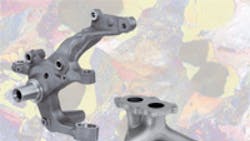An Extra Dose of Chemistry for Iron That's Hard and Ductile
Among manufacturers of automotive components, crankshafts are a “big catch.” Even in an underperforming market (such as now prevails), crankshafts are a high-volume product that’s also lucrative because of the precision and product performance that the buyers’ expect. Numerous research efforts in recent years have sought to establish the preeminence of forged automotive crankshafts, but one big automotive supplier is banking on cast iron.
Georg Fischer AG’s GF Automotive business has developed a grade of cast iron it is promoting for crankshafts, and it further claims that the SiboDur grade may be commercially viable for up to 50 different automotive parts. It reveals it has produced automotive components from Sibodur at its two ferrous foundries in Germany, Singen and Mettman, where its cast products include longitudinal bearings, steering knuckles, steering gear and gearbox cases, gearshift forks, wheel hubs and brake calipers.
“SiboDur” is a cast iron alloy that’s named for its silicon and boron alloys, as well as for the durability that GF is promising. That durability is the result of a “special manufacturing formula” that GF says reconciles hardness and ductility, which makes the alloy well suited to passenger vehicle chassis parts components.
Cast iron can be hardened by increasing the percentage of spheroidal graphite, but that addition may also increase the metal’s brittleness. Ductility can be enhanced by adding silicon, but the resulting product may be less castable.
“It’s a little like adding more butter when you’re baking a cake,” explains Werner Menk, GF Automotive’s Materials Development. But, Menk indicates that researchers overlooked the longunderstood principles of ferrous metallurgy, and raised the silicon content in order to achieve the desired ductility, while adding boron to help the material solidify.
“The key to success for my team and me is flying in the face of received wisdom and breaking new ground with a clear goal in front of us,” Menk says.
With Sibodur, the hardness that they achieved by their innovative chemistry makes this cast iron so hard that it can be used for components with thinner walls than comparable aluminum parts. Of course, cast iron also offers greater strength, lower volume, good formability, and low production cost than the light metal.
The parts produced from Sibodur have been adopted by Volkswagen for transverse links in its Golf series of front-wheel drive compact cars. Those parts (in VW, Audi, Seat, and Skoda brands) formerly had been forgings, according to GF Automotive.
